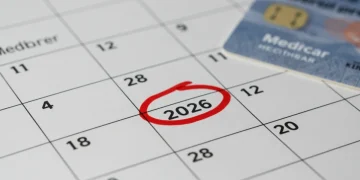Medicare Part B Premiums: 2025 Projections and Appeal Options

Medicare Part B premium increases are anticipated for 2025, impacting beneficiaries’ healthcare costs; this article explores the potential increases, factors influencing them, and detailed guidance on navigating the appeals process for those who disagree with coverage or cost determinations.
Understanding the potential for Medicare Part B premium increases in 2025 is crucial for beneficiaries on a fixed income. This guide will delve into what you can expect and how to navigate the appeals process if needed.
Medicare Part B Premium: Understanding the Basics
Medicare Part B covers essential healthcare services like doctor visits, outpatient care, and preventive services. It is a significant component of the Medicare program, providing access to necessary medical care for millions of Americans. The premium associated with Medicare Part B plays a vital role in funding these services and ensuring the program’s sustainability.
What is Medicare Part B?
Medicare Part B is the part of Original Medicare that covers medical services and supplies that are medically necessary to treat your health condition. This can include things like doctor’s visits, lab tests, and durable medical equipment.
How is the Premium Determined?
The standard Medicare Part B premium is set annually by the Centers for Medicare & Medicaid Services (CMS). Several factors influence the premium amount, including healthcare costs, inflation, and the overall financial health of the Medicare program.

Here are some key factors that influence the determination of the Medicare Part B premium:
- Healthcare costs: Rising healthcare costs directly impact the premium. As the cost of medical services and prescription drugs increases, the premium may also increase to cover these expenses.
- Inflation: General inflation can also drive up the cost of healthcare and, consequently, the Medicare Part B premium.
- Legislative changes: New laws and regulations can affect the funding and operation of the Medicare program, potentially leading to changes in the premium.
Understanding these factors can help beneficiaries anticipate potential changes in their Medicare Part B premiums and plan accordingly.
Projected Medicare Part B Premium Increase for 2025
Each year, the Centers for Medicare & Medicaid Services (CMS) analyzes healthcare spending and economic trends to project the upcoming year’s Medicare Part B premium. Understanding these projections helps beneficiaries prepare for potential increases in their healthcare costs. While the official numbers are not yet finalized, various estimations provide a general idea of what to expect.
Factors Contributing to Potential Increases
Several factors may contribute to a potential increase in Medicare Part B premiums for 2025. These include rising healthcare costs, increased demand for medical services due to an aging population, and the impact of new medical technologies and treatments.
Estimates and Predictions
While the exact premium increase for 2025 remains uncertain, several healthcare experts have offered estimations based on current trends and historical data. These estimates can provide beneficiaries with a range of possible premium amounts, allowing them to better plan their budgets and healthcare expenses.
Here’s a summary of the types of estimates and predictions you might encounter:
- Expert analyses: Healthcare policy analysts often provide projections based on economic forecasts and healthcare spending trends.
- Government reports: The CMS releases reports that include projections for Medicare spending and premiums.
- Insurance company forecasts: Some insurance companies also offer estimations based on their internal data and market analysis.
It is important to remember that these are just estimations, and the actual premium increase may vary when the official announcement is made.
Who Will Be Affected by the Premium Increase?
The Medicare Part B premium increase will affect most Medicare beneficiaries enrolled in Part B. However, the impact may vary depending on individual circumstances, such as income level and eligibility for assistance programs. Understanding who will be affected can help beneficiaries assess their own situations and take appropriate action.
Impact on Different Income Levels
The Medicare Part B premium is income-related, meaning that higher-income beneficiaries pay a larger premium than those with lower incomes. The premium increase may have a greater impact on beneficiaries with limited financial resources. Those with higher incomes will face a higher premium, as well.
Beneficiaries with Limited Income and Resources
Medicare beneficiaries with limited income and resources may be eligible for assistance programs that can help offset the cost of the Medicare Part B premium. These programs provide financial assistance to help low-income individuals afford their healthcare expenses.

Some of the programs that may provide assistance include:
- Medicare Savings Programs (MSPs): These programs help pay for Medicare premiums and other cost-sharing expenses.
- Supplemental Security Income (SSI): This program provides monthly payments to low-income individuals and families.
- Medicaid: This program provides healthcare coverage to eligible low-income individuals and families.
By exploring these assistance programs, beneficiaries with limited income and resources may be able to mitigate the impact of the Medicare Part B premium increase.
Reasons for Appealing a Medicare Decision
There are several reasons why a Medicare beneficiary might want to appeal a decision made by Medicare. Appeals are an important part of the Medicare system, allowing beneficiaries to challenge decisions they believe are incorrect or unfair. Common reasons for appealing include denials of coverage, disagreements with cost-sharing amounts, and issues related to the quality of care received.
Denial of Coverage
One of the most common reasons for appealing a Medicare decision is the denial of coverage for a particular service or item. Medicare may deny coverage if it determines that the service is not medically necessary or does not meet the program’s coverage criteria.
Disagreement with Cost-Sharing Amounts
Medicare beneficiaries may also appeal a decision if they disagree with the amount they are required to pay for cost-sharing, such as deductibles, copayments, or coinsurance. Beneficiaries may believe that they are being charged an incorrect amount or that they are eligible for a lower cost-sharing amount.
Some other reasons why you might disagree with cost-sharing amounts include:
- Incorrect billing codes: Errors in billing codes can lead to incorrect cost-sharing amounts.
- Incorrect application of deductibles: Beneficiaries may believe that their deductible has not been applied correctly.
- Eligibility for assistance programs: Beneficiaries may be eligible for assistance programs that reduce their cost-sharing amounts.
Understanding the reasons for appealing a Medicare decision is the first step in the appeals process.
How to Appeal a Medicare Part B Decision
Appealing a Medicare Part B decision involves several steps, from initiating the appeal to gathering supporting documentation and understanding the different levels of appeal. Following the proper procedures and meeting deadlines are essential for a successful appeal. The appeals process can seem daunting at first, but with a clear understanding of the steps involved, beneficiaries can navigate it effectively.
Step-by-Step Guide to the Appeals Process
The Medicare Part B appeals process typically involves the following steps:
- Filing an appeal: The beneficiary must file a written appeal within a specified timeframe, usually 60 days from the date of the decision.
- Gathering documentation: The beneficiary should gather all relevant documentation, such as medical records, bills, and correspondence with Medicare.
- Submitting the appeal: The appeal and supporting documentation should be submitted to the appropriate Medicare contractor or agency.
Deadlines and Timeframes
Meeting deadlines is crucial in the Medicare Part B appeals process. Failure to file an appeal or submit documentation within the specified timeframe may result in the denial of the appeal.
Levels of Appeal
If the initial appeal is not successful, beneficiaries may have the option to pursue higher levels of appeal. These may include a reconsideration by a Qualified Independent Contractor (QIC), a hearing before an Administrative Law Judge (ALJ), and a review by the Medicare Appeals Council.
Tips for a Successful Medicare Appeal
Increasing the chances of a successful Medicare appeal involves careful preparation, thorough documentation, and a clear understanding of the appeals process. Beneficiaries can take several steps to strengthen their appeals and present a compelling case to Medicare. A well-prepared appeal can significantly improve the likelihood of a favorable outcome.
Gathering Supporting Documentation
Gathering comprehensive supporting documentation is essential for a successful Medicare appeal. This may include medical records, physician statements, test results, and any other relevant information that supports the beneficiary’s claim. Documentation should be organized and presented in a clear and concise manner.
Writing a Clear and Concise Appeal Letter
The appeal letter should clearly state the reasons for the appeal and provide a detailed explanation of why the beneficiary believes the Medicare decision was incorrect. The letter should be well-written, organized, and free of errors. It should also include all relevant information and documentation.
Here are some tips for what to include in your letter:
- Beneficiary’s name and Medicare number
- Date of the initial decision
- Specific item or service being appealed
- Reasons for appealing the decision
Seeking Assistance from Advocacy Groups
Medicare beneficiaries may also seek assistance from advocacy groups or legal professionals who specialize in Medicare appeals. These organizations can provide valuable guidance and support throughout the appeals process. They can help beneficiaries understand their rights, gather documentation, and present their case effectively.
| Key Aspect | Brief Description |
|---|---|
| 💰 Premium Increase | Premiums may increase due to rising healthcare costs and inflation. |
| ⚕️ Part B Coverage | Covers doctor visits, outpatient care, and preventive services. |
| ⚖️ Appeals Process | Involves filing an appeal, gathering documentation, and meeting deadlines. |
| 🤝 Assistance Programs | Programs like MSPs and Medicaid can help with premium costs. |
Frequently Asked Questions
▼
Your Medicare Part B premium can increase due to rising healthcare costs, inflation, and changes in Medicare regulations. These factors can lead to adjustments in the standard premium amount.
▼
If you disagree with a Medicare decision, you have the right to appeal it. The appeals process involves several steps, including filing an appeal and gathering supporting documentation.
▼
To file an appeal, you must submit a written request to Medicare within the specified timeframe, usually 60 days from the date of the decision. Your request should include all relevant information and documentation.
▼
Your documentation should include medical records, physician statements, test results, and any other information to support your claim. The more comprehensive your documentation, the stronger your appeal will be.
▼
You can seek assistance from advocacy groups, legal professionals, or Medicare counselors specializing in Medicare appeals. These resources can provide guidance and support throughout the appeals process.
Conclusion
Understanding the potential Medicare Part B premium increases in 2025 and knowing how to navigate the appeals process is crucial for beneficiaries. By staying informed and taking proactive steps, you can effectively manage your healthcare costs and ensure access to the care you need.





